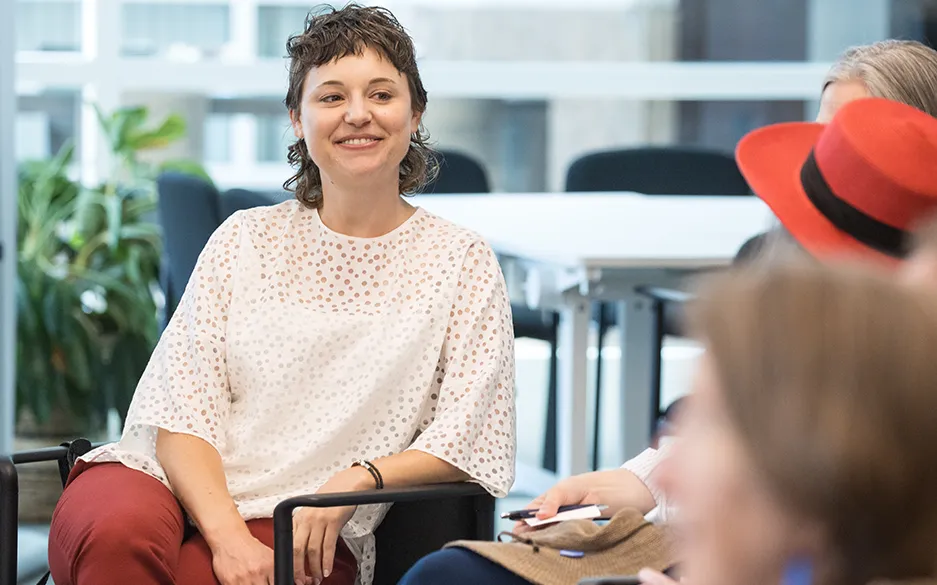Academic Structure
Academics

Flexible Five-Point Academic Structure
Meridian University’s five-point academic structure gives students the flexibility to shape their educational journey to match their passions, professional goals, and life commitments. Designed to serve a diverse, global student body at various professional stages, this structure supports students with varied visions for the next stage of their careers.
- New students enroll in a degree program and register for online and/or hybrid courses.
- While each program has distinct graduation requirements, all programs include anchor courses that support Meridian’s transformative leadership approach.
- Concentrations allow students to focus on specific areas of interest with elective courses that align with their goals.
- Students can choose between fully online or hybrid learning formats in addition to attending optional Transformative Learning Labs.
- For maximum flexibility, students can also choose the number of credits they take each quarter, switching between accelerated, standard, or part-time options.

Carter S.


Learning Formats
Meridian University offers two learning formats: Online and Hybrid.
- The Online format is ideal for students completing their degrees remotely, combining synchronous and asynchronous learning.
- The Hybrid format is tailored for those seeking a blend of online learning and in-person classes at Meridian’s Los Angeles Campus.


Meridian’s Learning Platform
Both online and hybrid courses utilize Meridian’s dynamic online learning platform, specifically designed to foster interaction and engagement.
Centered on a faculty-led approach, a primary goal is to provide a human-centered experience to all students, keeping them actively connected with faculty, peers, and resources via messaging, collaboration, and small-group activities.
Social groups provide students the structure to engage with others in their program and concentration, fostering valuable interactions during their academic journey at Meridian and beyond graduation.


Transformative Learning Labs
Students can optionally select to attend Transformative Learning Labs held at Meridian Centers globally.
Transformative Learning Labs help participants navigate internal and external complexities through experiential explorations led by senior and distinguished practitioners that connect purpose with emerging possibilities for professional practice.
Degrees Available
* Hybrid format available at the Los Angeles Campus.
Concentrations Available
Submitting
Stay Updated
Sign up below to learn more and stay updated regarding Meridian University's graduate and public programs.

Additional Program Structure Information
- Course availability varies by quarter and by program/degree. Students should seek clarification from their admissions advisor prior to enrolling regarding course and format criteria that are important to them personally or professionally.
- Concentrations do not have graduation requirements themselves or change the graduation requirements for the degree. Concentrations inform how the student selects elective courses, project topics, and Professional Specialty Programs, as well as how the student makes other topic-driven academic path choices. Courses associated with concentrations are offered based on demand. Concentration availability does not imply the offering of a specific course in a specific quarter.
- Generally, at least one lab is held each quarter, though more than one may be held. Labs are held onsite at Meridian’s Bay Area Center and other distributed locations, as well as online (i.e., Zoom).
- Students may attend a lab in more than two quarters each year (and therefore attend up to three or four labs), space permitting. Students who have not yet attended two labs in a given academic year are given registration priority.
- Students pursuing state licensure have additional specific course requirements and may need to complete additional credits beyond the published total credits required for the degree if they seek: 1) Both educational eligibility for licensure and a concentration that is other than the clinical concentration; 2) For PhD and PsyD students, educational eligibility for licensure other than that of Psychologist and/or; 3) Educational eligibility for multiple licenses.
- Meridian licensure preparatory curricula is designed for a specific set of state licenses. Students pursuing state licensure should keep in mind the specific licensure requirements for each state they may seek to practice within. Some state licensing boards require APA accreditation (American Psychological Association) which none of Meridian's Psychology degree programs have nor do faculty wish to seek, as this would affect the unique curriculum offered at Meridian. Note however that the University holds institutional accreditation from the WASC Senior College and University Commission which is a United States regional accreditor recognized by the US Department of Education.
- Part-time enrollment extends the length of the degree program. There are minimum and maximum credits required in each quarter to stay enrolled.
- Students can easily move between the two learning formats throughout their time as a student, based on availability.
- Students in the PhD in Psychology and PsyD in Clinical Psychology can earn the MA in Psychology degree during their enrollment if they complete the MA degree requirements on their way to earning a doctoral degree at Meridian.
- Students in degree programs that require field placement (internship) are responsible for utilizing the University's Fieldwork Handbook and support services to find their own employment/internship site. The University does not provide students with internal field placement/internship. Students can begin their field placement during coursework or wait until after completing coursework. Program Length figures published by the University assume students are taking courses on a standard or accelerated basis, not part-time, and that they complete their fieldwork during coursework, rather than waiting until all of their courses are complete to complete fieldwork.
- Students in degree programs that include a doctoral project requirement (Dissertation or Clinical Case Study) choose when to begin the 'clock' period. This period is either one year or two years depending on the degree program. Program Length figures published by the University assume students begin their clock in alignment with their taking the research coursework sequence, however students may wait until after coursework to begin their clock.
- The Student Success page includes important information regarding retention, on-time completion, and other key metrics. Prospective students should also review the University's School Performance Fact Sheets and Annual Report on the Consumer Information page. The School Performance Fact Sheet is also included for review and initialling in the University's Enrollment Packet.




Start Your Future at Meridian
Interested in learning more about the programs at Meridian?